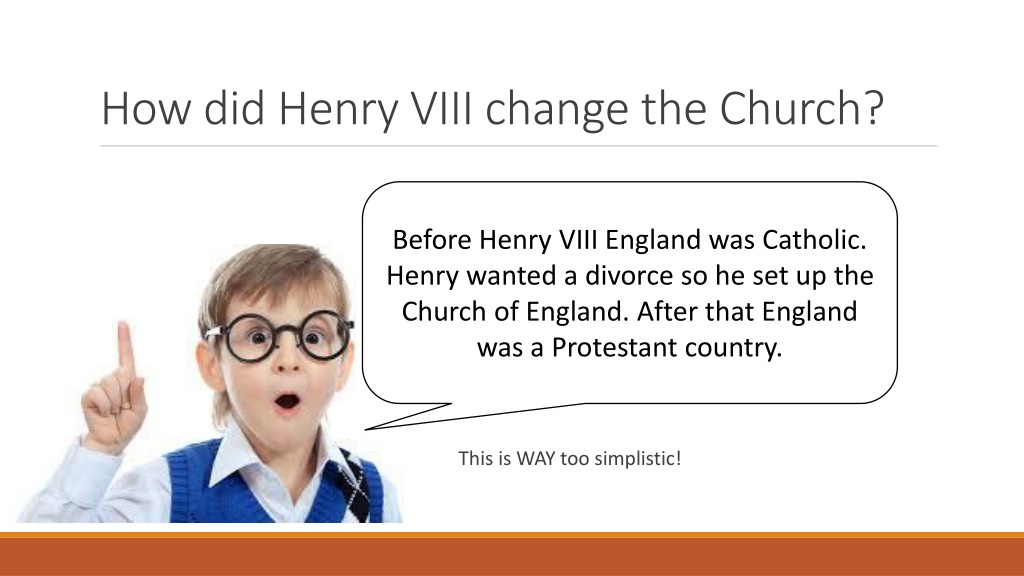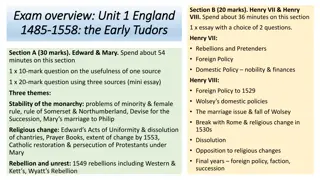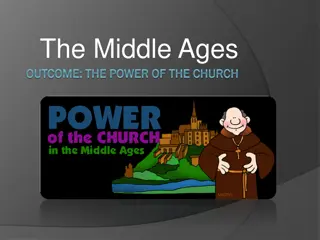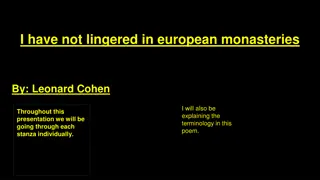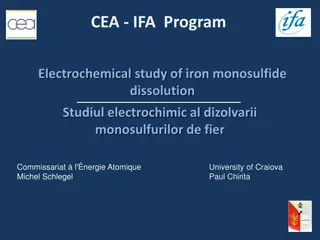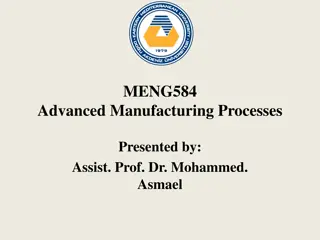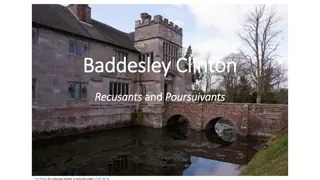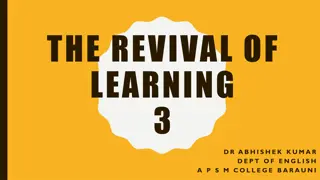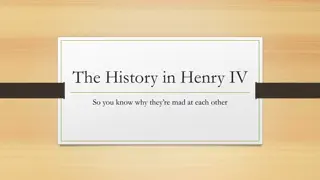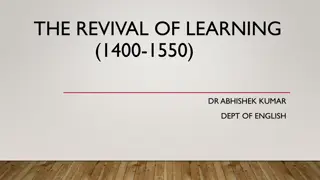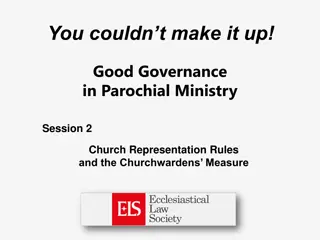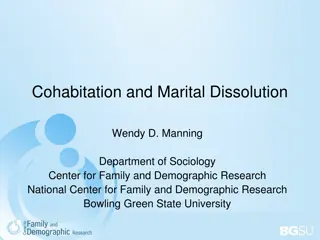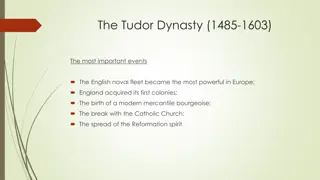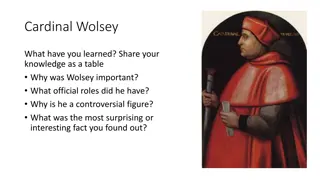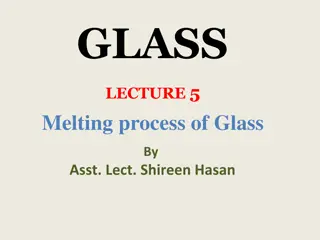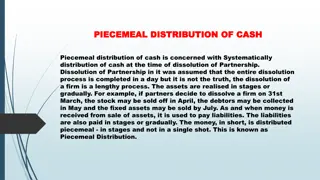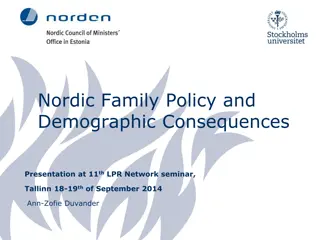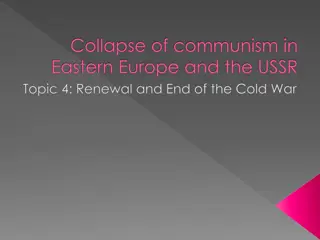Understanding Henry VIII's Impact on the Church and the Dissolution of the Monasteries
Explore how Henry VIII changed the Church from Catholic to Protestant, leading to the Dissolution of the Monasteries. Learn about key events like the Break with Rome, Act in Restraint of Appeals, and the Royal Supremacy Acts. Understand the roles of monasteries, the causes and consequences of their dissolution, and the importance of this historical period.
Download Presentation

Please find below an Image/Link to download the presentation.
The content on the website is provided AS IS for your information and personal use only. It may not be sold, licensed, or shared on other websites without obtaining consent from the author. Download presentation by click this link. If you encounter any issues during the download, it is possible that the publisher has removed the file from their server.
E N D
Presentation Transcript
How did Henry VIII change the Church? Before Henry VIII England was Catholic. Henry wanted a divorce so he set up the Church of England. After that England was a Protestant country. This is WAY too simplistic!
Starter: 1. Bullet point 5 differences between Catholics and Protestants. 2. Highlight the difference that you think is the most important.
What has happened so far? We are currently studying the Break with Rome. What has happened so far in relation to the Break with Rome?
What has happened so far? 1. Act in Restraint of Appeals 1533 HVIII s divorce was to be heard in England Catherine could not appeal to Rome This made the process quicker 2. Royal Supremacy by Act of Parliament 1534 Acknowledged the King as the head of the church Control of organisation, personnel and doctrine
By the end of this lesson everybody will be able to 1. Describe the dissolution of the monasteries 2. Explain the causes and consequences of the dissolution of monasteries 3. Judge and justify the main reason for the dissolution of the monasteries
Dissolution of the Monasteries 1. Dissolution The action of formally ending or dismissing 2. Monasteries A monastery is the name given to a religious community of people who have devoted their lives to God (monks and nuns).
What role did the monasteries play? 1. Prayed for the souls of the dead. 2. Provided education for the wealthy 3. Provided shelter and sanctuary for travellers 4. Helped the poor and needy with food and medical care. 5. Richer houses often had servants, which provided jobs in the local area Write these down in order of importance
The Dissolution of the Monasteries What? When? Where? Why? How? Consequences? What do you already know?
What you need to know for your exam 1. Causes 2. Process of dissolution 3. Consequences
Causes: Causes: use pp.79-80 to add evidence to the following points 1. How monasteries were regarded 2. Henry as Head of the Church (inspections) 3. Wealth of Monasteries 4. Land 5. Symbolism of Catholicism 6. Their role
Process of Dissolution: Process of Dissolution: use the table on p.80 to make a storyboard/timeline
From a report by Richard Layton, one of Cromwells commissioners, about the priory at Maiden Bradley, 1535 Maiden Bradley there you will find a holy father (monk) who has six children. His sons are all tall men who wait on him and he thanks God that he never meddled with married women, but only with maidens (the fairest that could be got). The Pope, considering the holy father s fragility, has given him a licence to keep a whore
Consequences: Consequences: use pp.81-2 to answer the following questions 1. How do historians describe the methods of dissolution? 2. Who benefited from the dissolution? How? 3. What is the debate surrounding who bought the land? 4. Who lost out from the dissolution? 5. What was the impact on Monks and Nuns? 6. What was the impact on learning?
Plenary: Why did Henry dissolve the monasteries? Which of these do you agree with? 1. Because he believed that monasteries were corrupt 2. Because he believed that praying for the dead wasn t important 3. Because he wanted money 4. Because he wanted to break the power of the Catholic church in England
Possible essay questions Protestant ideas were responsible for the development of the English Reformation in the years 1529 to 1547. Assess the validity of this view To what extent by 1509 was the church in England in need of reform? Henry VIII might have made himself supreme head of the Church of England but he did little else to change the church. Assess the validity of this view The Catholic Church in England in the period 1485 1529 was criticised primarily because of the failings of its clergy . Assess the validity of this view Changes in Religion in the reign of Henry VIII up to 1540 occurred because of Thomas Cromwell Assess validity of this view How far can Henry VIII decision to dissolve the monasteries be explained by the Crown s finance problems that had developed since Henry VIII became king in 1509?
Thinking questions 1. How far do you think that Henry VIII was committed to religious reform? 2. Why do you think Henry VIII changed his attitude towards reformers? 3. In what ways did Henry and the reformers need each other? 4. To what extent was the church reformed by the end of Henry s reign (in terms of doctrine)? 5. To what extent had the church changed in terms of practice? 6. How significant do you think Henry s religious changes were for ordinary people? 7. How significant do you think Henry s religious changes were for committed reformers?
Opposition to religious change YOU BE THE TEACHER!
Rebellion https://www.youtube.com/watch?v=e6ZqEil9bkI 11.58- 21:00 Pilgrimage of Grace 1. What does Aske suggest about the reasons for the rebellion? 2. What can you learn about how threatening the Pilgrimage of Grace was? 3. How did Henry defuse the Pilgrimage of Grace? 4. What does Starkey suggest about the consequences for the remaining monasteries?
The Lincolnshire Rising and the Pilgrimage of Grace Reasons Specific supporting evidence How significant was this reason? Religious reasons Economic reasons Opposition to government policies Influence of gentry/nobles Regional/local factors
The Lincolnshire Rising and the Pilgrimage of Grace Reasons Specific supporting evidence How significant was this reason? Religious reasons Concerns about loss of social functions of monasteries and possibly parish churches. Rebels wanted to restore some of the monasteries. Aske was a supporter of monasteries. Anger directed to Cromwell in Pontefract Articles Rumours that church plate and jewels would be confiscated and that parishes might be amalgamated. Scarisbrick says a range of factors but religion most important. Wore a badge of Five Wounds of Christ clearly religious (Catholic) symbolism Swore an oath contradicting royal supremacy, defend Catholic church, suppress heretics BUT pledged loyalty to king Ballads connected loss of monasteries to socio-economic distress Economic reasons Second rising in Dales, Cumberland and Westmoreland etc sent letters in name of Captain Poverty Ordinary rebels often more motivated by economic grievances (e.g. resentment of taxation) than leaders were. Social problems arising from dissolution mentioned in ballads Hoyle: Second revolt concerned with agrarian discontent. Had been poor harvests in 1535 and 1536. Enclosures and rising rents also unpopular. More significant in Dales, Cumberland, Westmoreland, North Lanc, Durham and West Riding than Linconlshire and East Risings
Opposition to government policies Dissolution of the monasteries, taxation RUMOURS OF NEW TAXES ON CEREMONTIES SUCH AS CHRISTENINGS, BURIALS AND MARRIAGES. Influence of gentry/nobles Elton argues there was a Courtly conspiracy to restore Mary as heir. Argues that it led by aristocrats and gentry (e.g. Lord Darcy in Yorks and Lord Hussey in Lincs). IDEA WAS THAT NOBILITY WANTED TO REASSERT POWER THAT THEY FELT THEY D LOST TO CROMWELL AND ANNE BOLEYN Regional/local factors Worried that monastic land would fall into the hands of southerners Discouragement of celebrating locally important saints (St Wilfred) Crown wanted to give lots of power to Duke of Suffolk in Lincolnshire (he was an outsider). May have contributed to outbreak of rebellion in Lincs. Elton argues that regional gentry were suspicious of court and their policies. Elton argues that political factions (WHO?) used this in rebellion.
Assessing the Pilgrimage of Grace What do you think was the most important reason for the Pilgrimage of Grace? How threatening to you think the Lincolnshire Rising and Pilgrimage of Grace was?
Opposition to religious change GROUP 1: RESISTANCE AND COURT GROUP 2: RESISTANCE WITHIN THE CLERGY Why did Henry execute John Fisher? Who opposed religious change? Who was the Nun of Kent and what did she believe? Why? What happened to the key people and why? How did others use the Nun of Kent s visions? What were the results? What does all of this tell us about Henry VIII?
Opposition to religious change In what ways did people show opposition to religious change? Why didn t more people show clear opposition to religious change? Does the relative lack of opposition suggest that the Reformation was popular? Why or why not?
